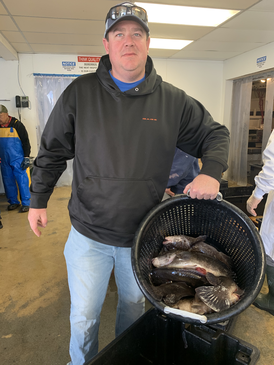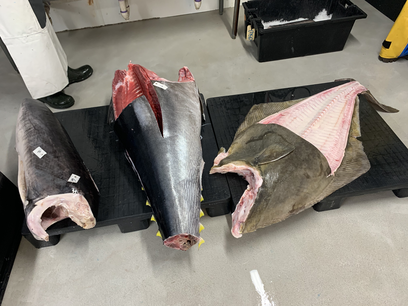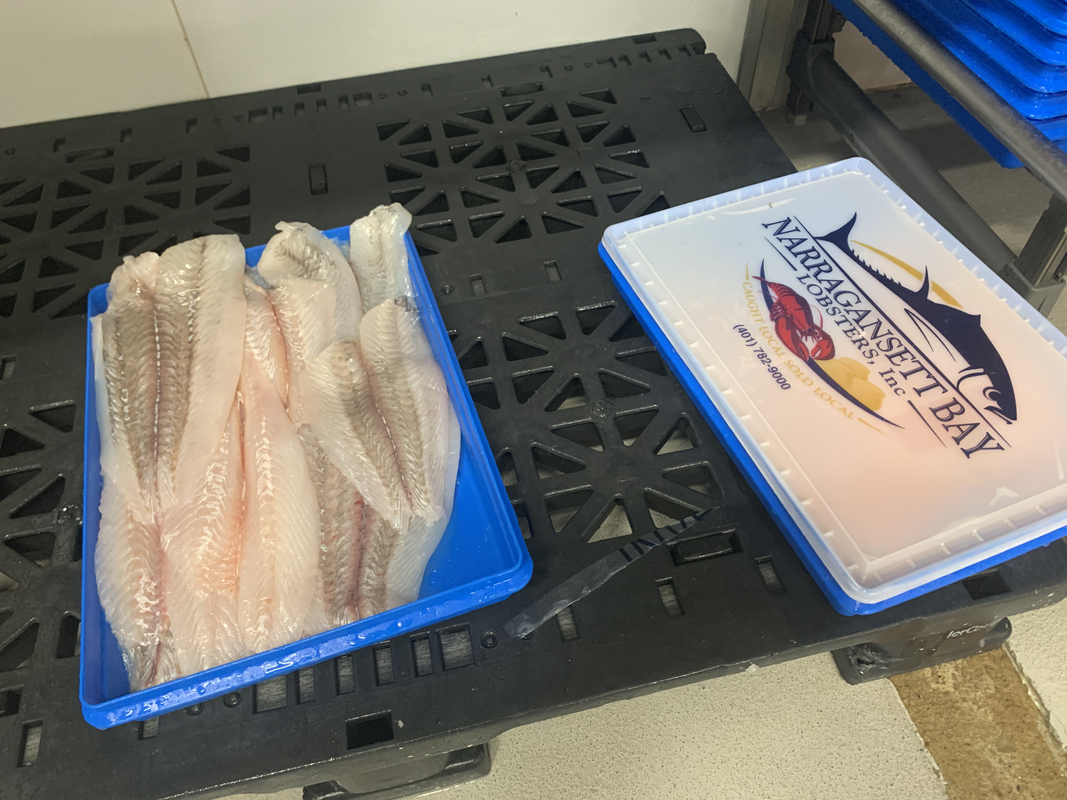|
By Sarah Schumann What should a business do when 80 percent of its customer demand dries up overnight? That is the question that Tom Lafazia and his coworkers were faced with in March 2020. Lafazia is the Purchasing and Sales Manager at Narragansett Bay Lobsters, a small seafood wholesale business that has served the Point Judith dayboat fleet since 1996. Eighty percent is the portion of its seafood that the company delivers to restaurants in Rhode Island, Southeastern Massachusetts, and Eastern Connecticut in a typical year. But this was no typical year. In March, as fears of a coronavirus pandemic spread across the world, restaurants across Southern New England closed their doors – some to protect the health of their staff, some to stave off economic loss, and some to comply with state government mandates that ordered a stop to in-house dining for several months in spring 2020. Wholesalers like Narragansett Bay Lobsters didn’t have much time to make a plan. Inshore boats, just gearing up for the season, were demanding to know whether there would be a market for their catch. Lafazia had to do something, quickly. “We pretty much started banging the phones,” he recounts. “We reached out to a lot of retails. We started doing more with Dave’s Market and smaller mom-and-pop retails. We got really aggressive. It was either that or shut down.” By working the phones overtime, Lafazia and his team were able to increase the company’s sales to fish markets and supermarkets by about 30%, helping to make up for some of the lost restaurant revenue. But what really saved the season was the introduction of a totally new sales channel into the company’s portfolio: home delivery. “I don’t think we could have kept going on a seven-day schedule without incorporating that into what we were doing,” Lafazia declares. Setting up a home delivery program was “a learning curve, for sure,” he admits. In addition to reconfiguring their fleet of refrigerated trucks and staff of eighteen to package and deliver small orders, Lafazia and his team had to figure out how to promote the new home delivery program. Having focused almost exclusively on wholesale efforts in the past, they were inexperienced at advertising their products to home consumers. “We talked to a lot of friends and stuff like that, had them putting the word out and getting involved in the social media,” Lafazia recalls. “I did some news and radio interviews.” Orders started flooding in, and with the orders came a lot of questions. “We’ve had people ask if they can keep their lobsters in the bathtub overnight. Or they’re buying raw shrimp and trying to eat them without cooking them,” Lafazia says. “Some people have no clue. It’s like, ‘No, you can’t keep your lobsters in the bathtub overnight. They will die.’ It’s been a ton of off-the-wall questions like that.” Some of these inquiries helped Lafazia realize that he, too, could benefit from improving his seafood cooking skills. “I can cook some fish, but I’m certainly no chef,” he admits. “It’s sort of fly-by-night when I cook something. A little salt, a little butter. I’ve been trying to bump that up a little bit – my knowledge and stuff like that.” In fact, this new emphasis on learning is one of the most valuable aspects of the home delivery program, Lafazia observes. “It introduces people to a lot of the things that they wouldn’t typically buy. It gives people a little bit more of a realization of what fresh seafood actually can be, versus a lot of what you see in the supermarkets. People rave about it.” Although home delivery was a spur-of-the-moment response to a specific shock, it is here to stay at Narragansett Bay Lobsters, says Lafazia. In fact, the company will soon launch a new website with recipes and tips to help consumers prepare more seafood at home. It also plans to expand the program beyond the fifteen Rhode Island cities and towns that it currently serves to include all of Rhode Island and Eastern Connecticut. This doesn’t mean that that Lafazia is sanguine about the future. Although sales to restaurants were surprisingly strong during the peak of the summer thanks to restaurants’ resourcefulness around outdoor dining, Lafazia is concerned that “as it gets colder, they’re not going to be able to accommodate the volume that they need.” If in-house dining is shut down again as it was in the spring, he predicts that beverage sales will plummet, depriving restaurants of a significant portion of their profits. “A restaurant can’t operate on 25 or even 50 percent,” he says. “The winter is definitely going to be tough.” In addition to diversifying its customer base, Narragansett Bay Lobsters is making efforts to diversify its purchasing base. For example, it has been offloading catch from four out-of-state longline boats for the last two summers. Hailing from New York, South Carolina, and Florida, these boats bring in up to twenty thousand pounds of tuna or swordfish each trip. Before Lafazia began courting these boats, they delivered their catch to New Bedford and other ports in the region. Their entry into the Point Judith community has been a boon, Lafazia says. “Dan [Costa] at DEM has been accommodating with helping me get these guys berthing and landing permits. We’re getting ice through other guys. The fuel guy’s getting stuff done with them. It’s really been a broad spider web. Champlin’s, George’s – they all go over there and drink and stuff, so they’re getting some action. It’s been good. Plus, some killer fish have been coming into the port.” Looking ahead, Narragansett Bay Lobsters intends to continue riding what Lafazia describes as a wave of demand for local seafood. “It’s always been our theme anyway,” he says. “That’s it. It’s no big science. We’re just taking it was it comes. No one really knows what to expect. I certainly don’t.”
Fishermen and seafood businesses:
Team up with the Fish Forward project to make your vision a reality! About Fish Forward: From now until September 2021, the Commercial Fisheries Center of RI and RI Small Business Development Center are teaming up to support business innovation and resilience in the seafood sector, thanks to general funding provided by the federal CARES Act. Contact [email protected] for more information or to get involved.
2 Comments
10/16/2020 04:44:49 am
I would like to know if there are any future plans to expand in to southeastern CT? I have only heard positive comments from my friends in RI. that have purchased your products. It is about a 1 hr. trip each way for me to purchase from you directly.
Reply
Leave a Reply. |
October is National Seafood Month, and we want to celebrate our waters’ bounty this year more than ever! Commercial Fisheries Center of RI invites you to follow our blog and social media for a special month of storytelling, as we profile local businesses and the exceptional resilience, grit, and innovative spirit that makes Rhode Island fisheries uniquely resilient.
Blog Topics |
Location |
|




